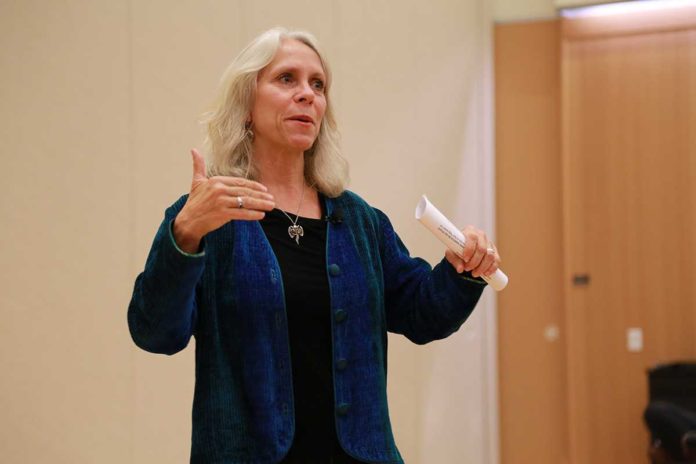“My name is Robyn Ochs,” social justice activist Robyn Ochs said on Wednesday, as the opening words to an interactive workshop for SRU students, faculty and staff. “I use chocolate pronouns, her she.”
Ochs, 57-years-old and originally from San Antonio, Texas, presented two lectures on Wednesday to students, faculty and staff: Ochs presented “The Changing Landscape of Identity” in 115 Vincent Science Hall from 3 p.m. to 5 p.m. and “Loosening the Gender Girdle” from 6 p.m. to 7:30 p.m. in the Smith Student Center ballroom.
During her lectures, Ochs addressed the importance of changing how the world sees gender and the timeline of how far the LGBTQIA+ community has come in the world, as well as how sexual orientation and gender identity work.
During her first lecture, Ochs and the audience created a list of what the world was like several decades ago for the LGBTQIA+ and how it is in the present day. This created an open discussion among Ochs and the audience.
While creating the list, Ochs informed the audience about the difference between transgender and cisgender.
“Cisgender is a word that is recent,” she said. “It means people who identify as the sex they were assigned at birth.”
However, during the lecture, the audience learned that there are not only two gender identities, as she had the audience brainstorm a list of gender identities and sexual orientations.
Ochs said it is important that people understand that a person can identify as more than one sexual orientation or gender identity.
“I am bisexual, pansexual and queer,” she said.
Ochs described pansexuality as seeing people as a panorama and having an attraction to people in general, but she noted that everyone’s definition of sexual orientations and gender identity are going to be different for everyone and that’s okay.
“Everyone has very specific recipes of what they are attracted to,” she said.
Ochs said in America, people live in a culture where sexual orientation is predominantly assumed as straight, when there are no obvious identifiers for people.
“People who meet me, just see me as straight,” she said, recognizing the reality of coming out every time she meets someone new.
Ochs said that celebrities like Lady Gaga and Macklemore have helped change a lot of perception about LGBTQIA+ people.
“[Being LGBTQIA+] used to be viewed as this very bad, bad, bad thing that a lot of people thought would actually cost you your life,” she said.
Ochs said that there is a lot of data that shows that LGBTQIA+ students are having a hard time in college. She said one out of every four students have experienced harassment.
“I think that we should be getting good LGBT education all throughout our lives,” Oches said, commenting on the lack of LGBTQIA+ education in high schools.
She said that everyone is going to be working with someone who is LGBTQIA+ at some point in their life and being more educated would be beneficial for everyone.
Ochs said that people tend to forget that heterosexuality is a sexual orientation.
During her second lecture, Ochs presented to a much larger group of students, staff, and faculty than the previous lecture.
Ochs started off by asking the audience when a baby is born, what is usually the first question? The audience replied by saying the sex of the baby. Oches said that from a young age, gender identity is taught and reinforced, despite there being no rule book for gender.
“People who break the gender roles most are often those who tell us what gender is,” she said. “Gender roles aren’t said or spoken.”
Ochs said she wants people to know that there are not any huge difference between the male and female body. She said that in the womb, everyone starts out as a female and then sex of the baby forms within weeks.
“We all have the same bits, they just develop differently,” she said.
Oches noted the importance of not using sex and gender, interchangeably. She the two words do not mean the same thing. Oches described gender identity as what a person feels in their head and sex as what a person has between their legs.
Oches said she is not preaching for a gender-free world, but that it is important for people to be open when it comes to gender identity and sexual orientation.
“There’s so much pressure to conform,” she said.
Ochs said she likes to think of transgender issues, as her own issues even though she is a cisgender woman. Ochs said if everyone were to view transgender issues as their own, then the world would be a safer place for everyone.
“There’s a whole lot of hostility towards trans people in our culture,” Ochs said.
Ochs noted that LGBTQIA+ and gender identity are not the only social issues of the world.
“We are not post-racism, we are not post-homophobia, we are not post-sexism,” she said. “There is still a lot of work to do.”
Before becoming a social justice activist, Ochs worked as a faculty member at Harvard University for 26 years.
Robyn Ochs was sponsored by the President’s Commission on Gender Identity and Sexual Orientation, the gender studies program, Psi Chi, the Pride Center, the psychology program, RockOUT, the President’s Commission on the Status of Women and the interdisciplinary program.








